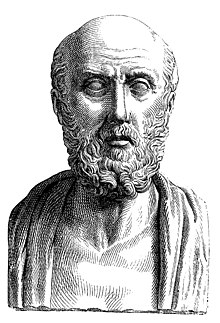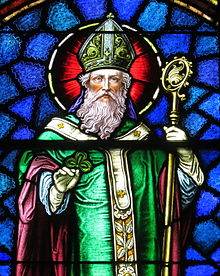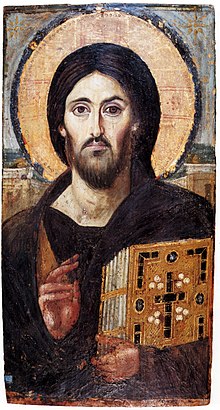Portal:Religion
The Religion Portal
Religion is a range of social-cultural systems, including designated behaviors and practices, morals, beliefs, worldviews, texts, sanctified places, prophecies, ethics, or organizations, that generally relate humanity to supernatural, transcendental, and spiritual elements—although there is no scholarly consensus over what precisely constitutes a religion. Different religions may or may not contain various elements ranging from the divine, sacredness, faith, and a supernatural being or beings. (Full article...)
 Vital article
Vital article
Vital articles to understand Religion.

 Did you know (auto-generated)
Did you know (auto-generated)
Did you know it about Religion?
- ... that across his thirty-six collections, fashion designer Alexander McQueen contemplated religion, told fairy tales, and criticized the fashion industry?
- ... that the nonconformist minister Ichabod Chauncey was banished from England under the Religion Act 1592 and spent two years in exile in Holland where he published a defence of his actions?
- ... that a religious community is a group of people who practice the same religion, but do not have to live together?
- ... that in her 2021 book White Evangelical Racism, professor of religion Anthea Butler called American evangelicalism a pro-Trump, "nationalistic political movement"?
- ... that fictional religions, often described in speculative fiction, have in some cases inspired real religious movements?
- ... that Musa va 'Uj depicts figures from all three Abrahamic religions?
Featured articles in Religion.
Hippocrates of Kos (/hɪˈpɒkrətiːz/, Greek: Ἱπποκράτης ὁ Κῷος, translit. Hippokrátēs ho Kôios; c. 460 – c. 370 BC), also known as Hippocrates II, was a Greek physician of the classical period who is considered one of the most outstanding figures in the history of medicine. He is traditionally referred to as the "Father of Medicine" in recognition of his lasting contributions to the field, such as the use of prognosis and clinical observation, the systematic categorization of diseases, and the formulation of humoral theory. The Hippocratic school of medicine revolutionized ancient Greek medicine, establishing it as a discipline distinct from other fields with which it had traditionally been associated (theurgy and philosophy), thus establishing medicine as a profession. (Full article...)
Top 10 WikiProject Religion Popular articles of the month
This following Religion-related articles is a most visited articles of WikiProject Religion, See complete list at Wikipedia:WikiProject Religion/Popular pages.
 Subcategories
Subcategories
Select [►] to view subcategories
Topics
Select [show] to view subtopics
 Get involved
Get involved
For editor resources and to collaborate with other editors on improving Wikipedia's Religion-related articles, visit WikiProject Religion.
Discover Wikipedia using portals









































![Image 1 Haft-sin in Iran Nowruz or Navroz (Persian: نوروز [noːˈɾuːz]) is the Iranian New Year or Persian New Year. Historically, it has been observed by Persians and other Iranian peoples, but is now celebrated by many ethnicities worldwide. It is a festival based on the Northern Hemisphere spring equinox, which marks the first day of a new year on the Solar Hijri calendar; it usually coincides with a date between 19 March and 22 March on the Gregorian calendar. (Full article...)](http://upload.wikimedia.org/wikipedia/en/d/d2/Blank.png)



















